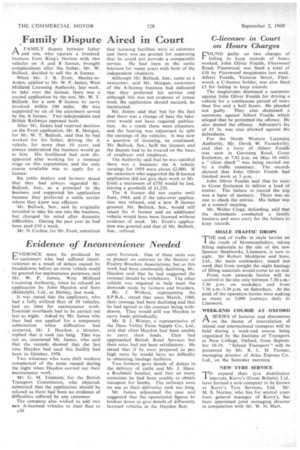. •Famity Dispute
Page 32

If you've noticed an error in this article please click here to report it so we can fix it.
4
Aired in Court
AFAMILY dispute between father and son, who operate a livestock business from King's Nortonwith two vehicles on A and B licence, brought complications after the father,Mr. W. Bullock; decided to 'sell the .A licence.
When Mr: .1; B. Evett, Henley-inArden, aPpliCd.to Mr. W. P. James, West Midland LicensingAuthority', last week, to take over the licence, there Was a" second application by the son; Mr. W. T. Bullock,. for anew B licence to carry livestock Within 100 miles. He was s'uPParted by six of the ctistorners served by the A licence. Two independents and British Railways opposed both.
After Mr. James had reserved decision on the Evett application, Mr. R. Morgan, for Mr. W. T. Bullock, said that he had worked for his father, driving the A vehicle, for . more than IO years and always understood the business would go to him. His livelihood had now disappeared after working for a nominal wage on this expectation, and the only course. available was to apply for a licence..
Six cattle dealers and farmers stated that they had always regarded Mr. Bullock, Jun., as a principal in the business and supported his application because they preferred a cattle carrier whom they knew was efficient.
Mr. Bullock, Sen., said he originally intended to take his son into the business, but changed his mind after domestic difficulties. During the past year he had been paid £10 a week.
Mr. N. Carless, for Mr. Evett, submitted
that licensing facilities were in existence and there was no ground for supposing that he Could not provide a comparable service. He had been in the cattle business for many years with both of the independent objectors.
Although Mr. Bullock, Jun., came as a newcoiner, said Mr. Morgan, customers of the A-licence business had indicated that they preferred his service and although this was not evidence of actual need, the application should succeed, he maintained. .
Mt. James said that but for the fact that there was a change of base the takeover would not have required publication. As a result there were objectors, and the hearing was adjourned to split the earnings of the vehicles. It was now a question of licensing, he continued. Mr. Bullock, Sen., held the licences and the dispute had to be treated on the basis of employer and employee.
The Authority said that he was satisfied there was a business; the A vehicle earnings for 1959 were about £2,000. If the customers who supported the B-licence application did not give their work to Mr. Evett a maximum of £750 would be lost, leaving a goodwill of £1,250.
The A licence did not expire until June, 1964, and if the take-over application was refused, and a-new B licence granted, Mr. Bullock, Sen., would still retain his A licence and an additional vehicle would have been licensed without evidence of need. Mr. Evett's application was granted and that of Mr. Bullock, Jun., refused.








































































































